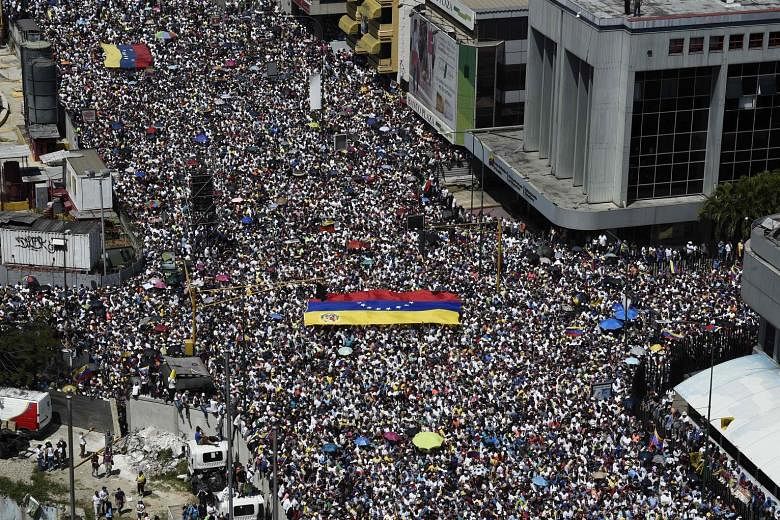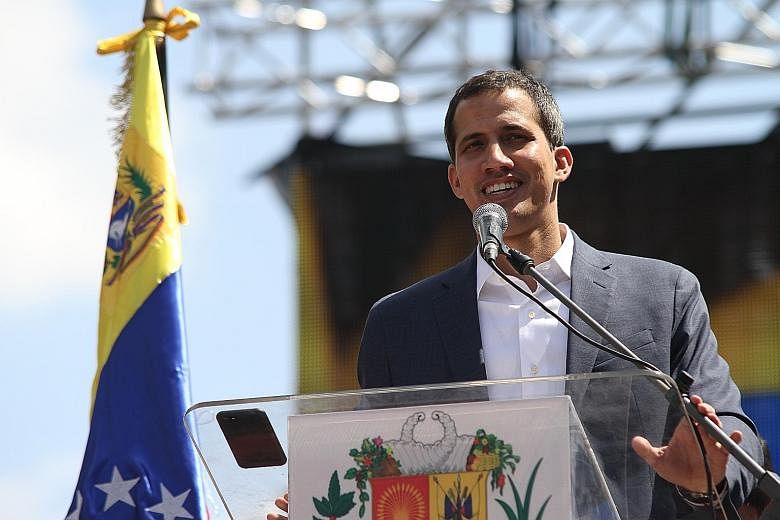CARACAS • Venezuelan President Nicolas Maduro proposed early parliamentary elections on Saturday, seeking to shore up his crumbling rule after a senior general defected to the opposition and tens of thousands thronged the streets in protest against his government.
As domestic and international pressure mounts for Mr Maduro to step down, a senior air force general disavowed him in a video that circulated earlier on Saturday, expressing his allegiance to Parliament head and self-proclaimed interim president Juan Guaido.
The military's support is crucial for Mr Maduro, who is deeply unpopular, largely due to an unprecedented economic crisis that has prompted an exodus of millions.
Mr Maduro claims he is the victim of a coup directed by the United States.
In a speech to supporters, he said the powerful government-controlled Constituent Assembly would debate calling elections this year for the National Assembly Parliament, which is opposition-controlled.
Mr Guaido has called for a new, fair presidential election after the disputed vote won by Mr Maduro last year.
"You want elections? You want early elections? We are going to have parliamentary elections," Mr Maduro told a pro-government rally in Caracas, held to commemorate the 20th anniversary of late socialist leader Hugo Chavez's first inauguration as president.
While small rebellions against Mr Maduro have broken out in Venezuela's armed forces in recent months, there has been no large-scale military uprising against him.
However, General Francisco Yanez of the air force's high command became the first active Venezuelan general to recognise Mr Guaido since he proclaimed himself president on Jan 23.
Venezuela's chief military attache to the US also said he was defecting last week.
"People of Venezuela, 90 per cent of the armed forces of Venezuela are not with the dictator, they are with the people of Venezuela," General Yanez said in the video. "Already, the transition to democracy is imminent."
At an opposition rally in Caracas, Mr Guaido told his supporters that he expected more to follow General Yanez's example.
Mr Guaido, a previously little-known 35-year-old industrial engineer, has offered the military and public officials amnesty if they defect. "I am certain many officials and soldiers will repeat this gesture, very soon, very soon," he said.
The rally was one of many nationwide on Saturday, where demonstrators decked out in the yellow, red and blue colours of the Venezuelan flag honked horns, pounded on drums and chanted "Guaido, Guaido, Guaido".
Mr Pedro Gimenez, 51, a factory worker in the southern state of Bolivar, said: "It's been years of destruction of companies and poverty. We want a better present and future and we are about to achieve that."
Humanitarian aid from an "international coalition" would soon flow into Venezuela, which is facing rampant hunger and medicine shortages, from collection points in Brazil, Colombia and a Caribbean island, Mr Guaido said.
The self-declared president, who has no control over state institutions or any functions of day-to-day governance, said the opposition would not let up on protests until Mr Maduro stepped down and allowed free elections.
Mr Maduro's adversaries say he has run roughshod over democratic institutions and destroyed the once-buoyant economy through a corruption-riddled exchange control system and arbitrary nationalisations.
The US, Canada and several Latin American nations have recognised Mr Guaido as the legitimate head of state.
US President Donald Trump said yesterday that sending the military to Venezuela was "an option" and that he had turned down Mr Maduro's request for a meeting.
Mr Trump said in a CBS interview: "Well, he has requested a meeting and I've turned it down because we're very far along in the process."
Some European Union member states are expected to officially recognise Mr Guaido next week.
But Mr Maduro still has the backing of Russia, China and Turkey.
Turkey's Foreign Minister Mevlut Cavusoglu said yesterday that countries which have recognised Mr Guaido were fuelling Venezuela's troubles and punishing millions of its people.
"There is a problem in a country, there is a spark that can turn into a fire at any moment. In this case, they should have contributed to the solution of the problem through dialogue," Mr Cavusoglu told reporters in Istanbul.
"But is that how they handled things? No. On the contrary, the event was fuelled from the outside. The people of Venezuela are being punished by such approach," he said.
REUTERS


